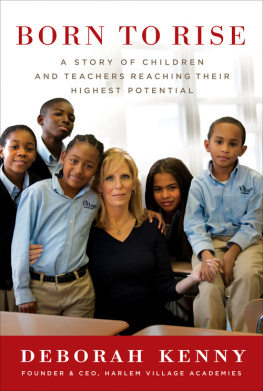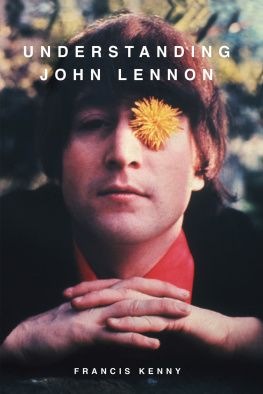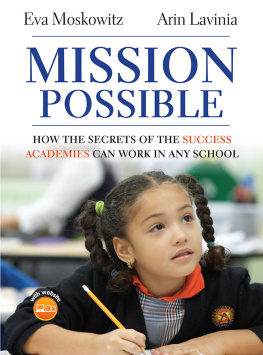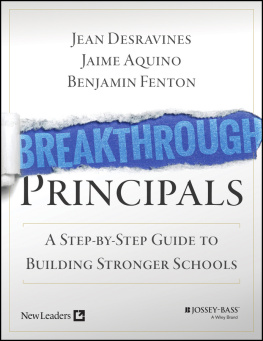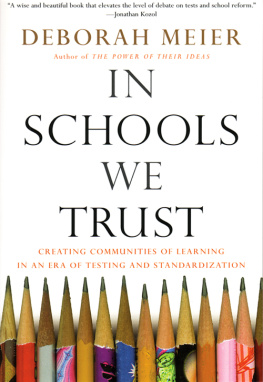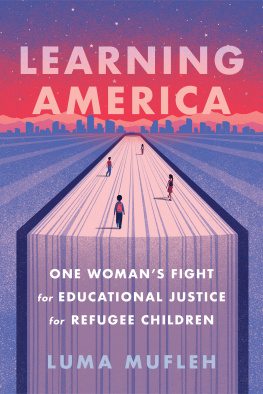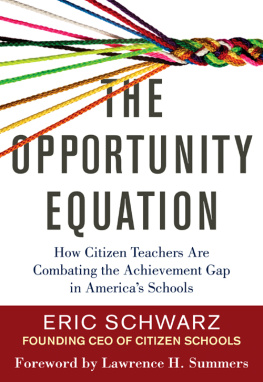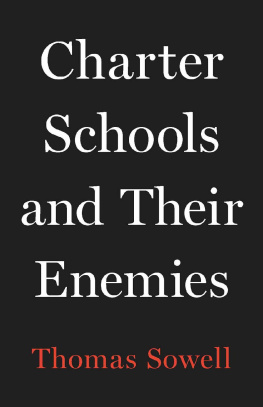Born to Rise
A Story of Children and Teachers Reaching Their Highest Potential
Deborah Kenny

www.harpercollins.com
For My Children
Contents
Searching
What Life Expects
People, Not Product
Providence
A School for My Children
Down to the Wire
Startup
Rock Stars
The Path to Justice
Drowning
My Child Is a Child Again
I Used to Throw My Books Away
People and Culture
Scenes from a Revolution
Be the Culture
Born to Rise
The Education Manifesto
Searching
O kay, ready for your three clues? he asked. This country starts with a V and its in South America. The capital is Caracas and the people speak Spanish.
It was another round of Kenny family geography, a game my husband, Joel, had invented to keep our three young kids busy during car rides.
Thats four clues! shouted Rachel, our youngest, then age six.
The first letter of the country doesnt count, our eight-year-old, Chava, stated firmly. We get that for free.
Its Venzulia! fired Avi, nine, and very much the oldest.
Nice try, Av, said Joel from behind the wheel. Youre close.
Trust me, Dad, its Venzulia , Avi repeated emphatically.
Suddenly we heard a lot of shrieking and giggling as our three children began another game they liked even better. They called it boxing, but they were actually just playfully hitting each other.
Knock it off! Joel said, grinning. Avi, I told you that youre close. Think about it.
Dad, Im going to ask you one last time. Is it Venzulia?
Joel and I burst out laughing.
It was a golden Sunday in June of 1998, and we were headed to a science museum in Connecticut. The kids had been looking forward to this trip for weeks. Theyd been eager to see the exhibit about marine biology ever since wed rented a video about whales the month before.
We zipped north along the Saw Mill River Parkway in Westchester, New Yorkjust twenty more minutes, I told the kidswhen Joel said he felt a bit dizzy. We figured it was the flu.
But the next morning Joel felt even fainterstrange for a guy who never complained and never got sickso I drove him to a doctor, just to check.
The doctor ran a few blood tests and said hed be back shortly with the results. A half hour went by. Then a full hour.
Finally, the doctor came back into the room. I dont want to alarm you, he said softly, but this could be serious. Joel, there is a chance you have a leukemic condition.
He tried to keep us calm. Nothing is definite yet. But you need to have a spinal tap.
We drove back home and I started making calls to figure out what to do. As I arranged an appointment for the next day, Joel lay very still on the bed staring at the ceiling. Just looking at him, so silent and scared, devastated me. But I tried not to let that show. The tests will come back negative, I said, holding his hand. All of this will be over tomorrow.
That night, it was impossible to sleep. I spent the dark hours before sunrise praying silently, asking God to protect Joel.
The next morning we drove to Mount Sinai Hospital in Manhattan for the spinal tap. It was an excruciating procedure, but it was the only way to figure out exactly what was wrong, and it had to be done immediately. I sat by his side as we breathed together the whole time, holding hands. When it was finally done, we expected to go home. Instead, the specialist sent us to the third floor.
Joel and I didnt acknowledge the two words that accosted us when we stepped off the elevator: Oncology Unit. As we waited in an empty room, I was petrified but I buried that feeling. Instead, I tried to distract Joel with questions about his dissertation and he tried to distract me with jokes.
Suddenly, some ten doctors, nurses, and residents swarmed the room. I stopped breathing. The doctor looked straight into our eyes, and spoke immediately: Im sorry, Joel. You have leukemia.
J oel was the person in the world I most admired, one of those rare individuals born to a higher purpose. I was enchanted by him from the moment we met.
I was twenty-four years old and had just ended a relationship with a Harvard law student who was smart, ambitious, and good-looking. But I hadnt connected with him on a deep level. I was hoping to meet someone with soul.
Within half an hour of our first date, Joel and I were discussing spirituality. As we walked around Greenwich Village in lower Manhattan, I learned that he played guitar, loved nature, painted, and was a Dallas Cowboys fan. The four Kenny brothers, he explained, played football almost every day in their backyard as kids, and they never missed a Cowboys game.
Joel, quiet but confident, was not intimidated by me. His mother, Shirley, was a college president who had worked full-time as an English professor while raising five children in McLean, Virginia, with Joels father, a history professor.
In between our dates, he wrote me love letters with pink hearts hand-drawn in colored pencil on the envelopes. Before long we started talking about the future. He told me about his desire to teach, to write books, to have a big family, and to compose his own music. I was falling in love.
Like me, Joel had studied religion and philosophy in college. Id never been with another person who thought debating the nature of Truth was an ideal way to spend a Saturday night.
For as far back as I can remember, Id been this way. In high school, my parents worried that I was too serious. They encouraged me to try more activities, to lighten up, to be well rounded. My response was to write an editorialThe Myth of the Well Rounded Childin the school newspaper, in which I argued that it was more valuable to pursue one thing intensely than to participate in a wide variety of school activities.
I didnt fit into any clique, and I didnt care much about being popular. I spent prom night with Sara, one of my best friends, talking in her kitchen and eating tuna melts.
The summer camp Sara and I attended was a welcome change from the superficiality of high school. While the kids loved to socialize and have fun, it was the kind of place where it was cool to be smart and everyone fit in. The camp was dedicated to Jewish values and social justice. The chorus of our camp song was You and I will change the worldand everyone actually believed it, including me. It was bliss.
It was at camp where I met the teacher who would change my life: Mel Reisfeld. He was an extraordinary and often irreverent educator, and for many decades the camps heart and soul. He was the coolest adult we kids had ever met. Mel could captivate hundreds of campers and counselors for hours with lectures about history, heritage, and social justice. My favorite stories were about his activismhow in 1963, he got in a car with a friend and two students and drove to D.C. for the March on Washington to hear Dr. Martin Luther King Jr.; how he led efforts to raise funds for Biafra when Africans were starving; how he had helped organize one of the very first walkathons for the March of Dimes; and how he joined in protests to support farm labor leader Csar Chvez. We have to care about people, he would always say. Mel also loved to provoke us. One night at dinner he gave eight of us the following challenge: How many of you know how to say fuck in another language? We tried to impress him with our linguistic skills for the next hour.
Despiteor perhaps because ofhis irreverence, Mel was a role model for the other counselors, many of whom had been activists in the 1960s. They were all, like Mel, independent thinkers who challenged societal norms. I related to their worldview: challenging the establishment made immediate sense to me.

